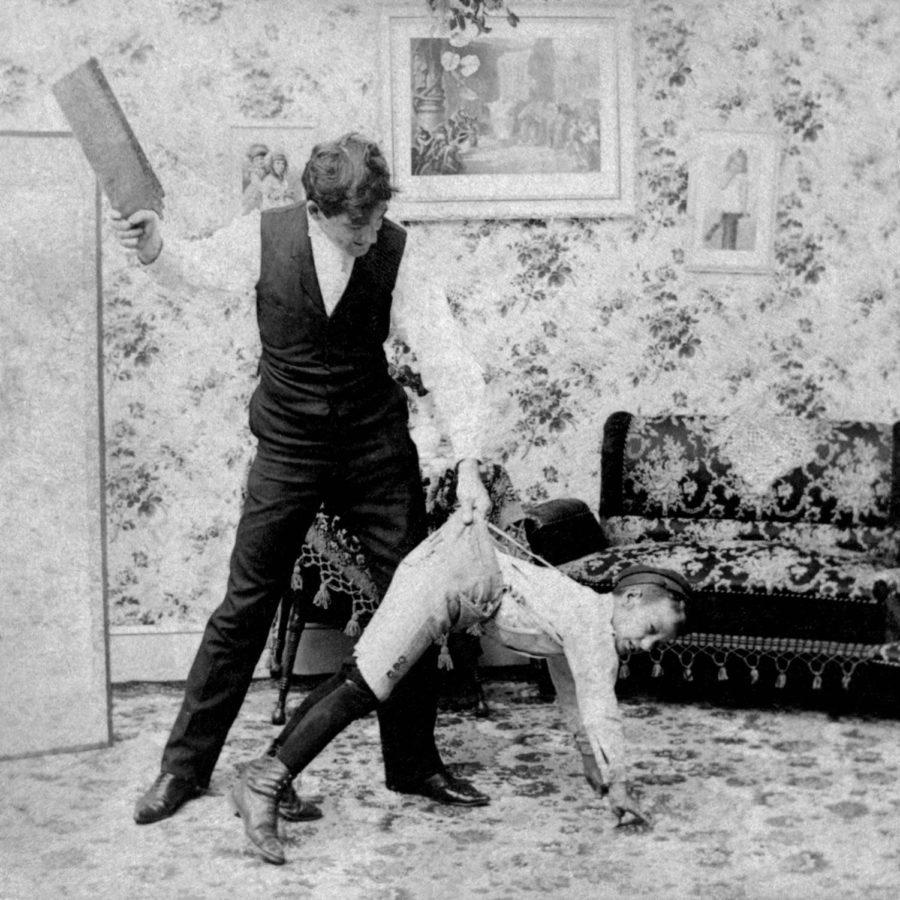Murataugh: To spank or not to spank
Vintage image of man paddling boy
February 17, 2011
If you’re anything like me, you were spanked when you were little.
My family always jokes that while growing up, there were “no time-outs in our house!” No, we were spanked instead.
It wasn’t a lot or anything. For the most part, my brothers and sister and I were good kids, so our parents didn’t need to resort to spanking as a form of discipline very often. But occasionally, when we were being disrespectful, we were spanked.
This shouldn’t come as much of a shock to most of you. An occasional spanking is considered an acceptable form of discipline in most countries; most parents have spanked their children before, and most people can recall being spanked during their childhood.
My dad tells a funny anecdote about how when he was a kid, my grandpa broke a board over his head. All right, it doesn’t sound that funny when I write it; but I promise, when he tells it, it’s funny.
This is because he said he deserved it; and let’s face it, he probably did. I mean, my grandpa is not an abusive man or anything; he’s one of the most gentle people I know. But back then, using violence as punishment was more common than it is today, especially for an Irish Catholic family of five rambunctious boys and two girls.
It happened like this: My father and his brother were fighting and messing around at church. They were no doubt disruptive and disrespectful, and they didn’t stop, even after a few angry looks from their old man. My dad snickered and thought, “He can’t do anything to me here, in front of God,” clearly forgetting the service would end sometime and when it did, he would feel the wrath of his father.
Back at home, my grandpa lightly spanked the boys with the board. My uncle, clearly wiser with age than my dad, faked a cry and immediately apologized. But my dad, in a defiant air, proclaimed, “That didn’t hurt.”
Grandpa hit him harder a few times and with each strike my dad said stubbornly, “That didn’t hurt.”
Finally he broke the board over his head. This is the part in the story where my dad delivers the punch line: “That hurt.”
For years, spanking was consistently found to be a cultural norm in the United States. However, Murray A. Straus, author of “Beating the Devil Out of Them: Corporal Punishment in American Children,” said the percent of U.S. citizens believing spanking is sometimes necessary dropped from near unanimity to 55 percent between 1968 and 1998.
So why the drop in approval ratings? Probably because a lot of studies link corporal punishment with negative effects later in life, including aggression, behavior problems and mental health problems.
Right now, advocates of spanking are probably thinking, “I got spanked, and I turned out perfectly fine.”
I know of a psychologist who likes to reply to this very common argument with, “Yeah, but you think it’s OK to hit little kids, so are you really perfectly fine?”
No matter your opinions on spanking children, it’s important to remember that these studies don’t imply that all children spanked will grow up to be exceptionally violent individuals. Every child is different, though, so how do you know which child will and which child won’t?
I learned in a couple of psychology classes that spanking is used so that the child will associate his/her negative behavior with punishment and therefore be less likely to repeat that behavior. It can also serve as a reinforcement of negative behavior.
Some parents will try to send a message to children that their negative behavior — for instance, hitting another child — is unacceptable. However, by spanking children, you are in fact reinforcing violent behavior, because they see the effectiveness of it firsthand.
Basically, you wanted them to stop their bad behavior, and because you hit them, you accomplished your goal. Now when they want other kids to stop doing something, what do you think they’ll do? See? Effective.
There are some valid arguments for the spankers, though. For instance, when psychologists reach their conclusions, they might not be looking at other factors that can influence averse behavior later in life. After all, correlation doesn’t equal causation.
Psychologist Diana Baumrind said if a parent is loving, firm and communicates well, children tend to turn out to be well adjusted whether they were spanked or not.
Baumrind also found that once parents who used more severe forms of punishment than mild spanking were taken out of the studies, the results were different.
An occasional swat resulted in few harmful effects, if any. The key is to use physical discipline mildly and sparingly, but that line can be thin.
During Christmas Break, I got into somewhat of an argument with my family about this topic. Some of my relatives believe strongly that spanking is, at times, necessary and very effective.
I don’t argue with this. It is effective, sometimes, especially if the parent desires an instant fix. However, I do think that research by psychologists suggesting otherwise should be taken into consideration.
My parents did a great job raising their kids, in my opinion. I’m not a parent, so I can’t really place judgment on people who use spanking, time-outs or any other form of discipline.
As my parents so lovingly reminded me, maybe in 10 years when I have kids of my own, I’ll see it from their perspective.
My point is, as the next generation of parents, we should look at both sides of subjects like these. For the sake of our future children and our future world, we should take studies like these seriously and not just immediately dismiss them.







